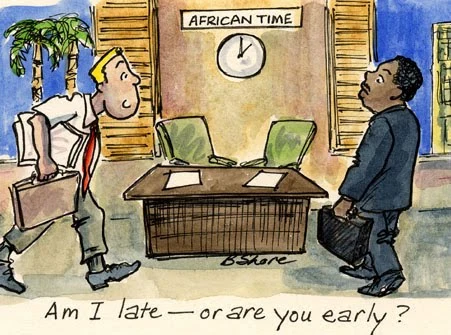
By Igdaliah J. Otitoola
Amaka couldn’t believe her eyes. She cross-checked the time on her phone to be sure her wristwatch wasn’t deceiving her. She could swear she wouldn’t be allowed into the venue since she was 45 minutes late, only to meet decorators at odds as to what pins to use for the draperies and organizers at war with the sound system giving occasional screeches and pops. Although this was her third such experience this month, this was undoubtedly the worst. The straw that broke the camel’s back was that this time, she was so much in a hurry that she could neither get her make-up done nor finish her morning routine.
Whether in a social function, a religious gathering, a special occasion, a business meeting, or a public event, many of us can relate to Amaka’s experience at her friend’s wedding ceremony. Nigerians’ penchant for arriving late to meetings and events has been dubbed the “African Time” syndrome (having been observed to be prevalent across the African continent and even some Caribbean nations), and responsible for this, among other things (such as a flagrant disregard for the sanctity of time), is the repeated “punishment” for punctuality and “reward” for tardiness. For instance, Amaka now learns her lesson, such that when next she goes to an event, she takes her time, and though she arrives there “late,” she happens to be right on time.
The thesis of this article is that the apparent perpetuity of tardiness in Nigerian culture can be attributed in part to this trend, and this can be compared to the psychology of habit formation. A “bulwark” is a defensive wall, often multiply fortified, or a person or thing which acts as a defence or support, preventing invasion and external attack. The bulwark theory proposes that this trend acts like a formidable bastion so hard to penetrate, such that the habit of lateness in many Nigerians is near impossible to break.
Research in Psychology has established two ways to form habits: operant conditioning and observational learning. In the former, behaviours are shaped by either positive or negative reinforcement. This idea was developed by American psychologist B. F. Skinner who studied the behaviour of rats and discovered that he could encourage or discourage behaviours based on a reward or punishment system. In the latter, people learn behaviours by observing and modelling other people’s behaviour, attitudes, or emotions. It was American psychologist Albert Bandura who posited this, having studied babies and young children and found that they imitated the behaviour of those around them.
According to neuroscientist Russel Poldrack, Professor at Stanford University and author of Hard to Break: Why Our Brains Make Habits Stick, habits are so powerful because they are formed through connection changes between nerve cells in the parts of the brain involved in choosing our actions. When we choose an action and it has a positive outcome, it leads to stronger connections between the nerve cells that caused that action, which will make that action occur more in the future, and ultimately form a habit that will be difficult to break.
Inferring from these perspectives, some things stand out to us: (1) there are both internal (psychological) and external (social) incentives in habit formation, (2) it wouldn’t be totally inappropriate to extrapolate these incentives to a larger, communal scale to account (at least in part) for such phenomena as the “African Time” syndrome, and (3) this approach helps provide applicable insight into how such phenomena may be effectively addressed.
What feeling accompanies the memory of one’s lateness to an event in the past? If it’s good (as in reward), it will be deemed worthy of being repeated. If it’s bad (as in punishment), it will be avoided at all costs. This is why it was easier to resolve to go early to school when being late meant yielding yourself to be flogged by that notorious teacher or spending the first few hours of the day cutting grass.

Therefore, the “African Time” syndrome will be almost impossible to break because, rather than confront lateness with serious consequences (such as being denied entry into the event or some other right or privilege), those responsible (e.g., organizers of events) will rather wait and “reward” latecomers by starting the event late—thereby justifying their tardiness.
Hence, just as a habit is reinforced on a discrete scale (e.g., by the sensation of pleasure derived from eating sweets and chocolate or the dopamine released upon checking your social media feed for likes) but certain actions never result in habits (e.g., getting burned because of the pain or discomfort caused), this reward-punishment system is what continually reinforces the “bulwark” and ensures the perpetuity of the “African Time” syndrome.
Also, the social factor (“everybody does it”, “people won’t have arrived yet”, “I don’t want to be the first to arrive”) contributes to this bulwark, especially if those whom we model tend to be late as well. It is also why subordinates will be less incentivized to be early to a meeting if superiors themselves are fond of being late.
If Nigerians will break this “jinx” (as some are already doing in business, religious circles, and other quarters), they must be willing and ready to reconfigure the reward-punishment system to disfavour the propensity for lateness by enacting measures to penalize lateness and reward punctuality. Until then, the “African Time” syndrome may just remain, like the proverbial leopard’s spots and Ethiopian’s black skin, a distinguishing feature of Nigerians which they can hardly get rid of, and Amaka will probably never strive to be early to another event.
References
https://newsinhealth.nih.gov/2012/01/breaking-bad-habits
https://www.rd.com/article/how-long-does-it-take-to-break-a-habit/